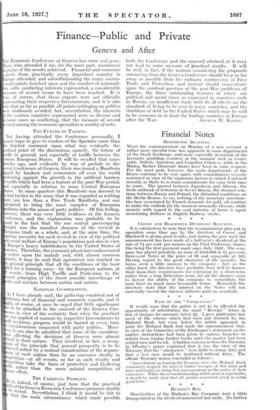Finance—Public and Private
Geneva and After
HE Economic Conference at Geneva has come and gone, lose who attended it are, for the most part, unanimous ) praise of the results achieved. Financial and economic xperts from practically every important country in urope attended, and notwithstanding the many contro- ersial points touched upon and.the number of nationali- es with conflicting interests represented, a considerable ieasure of accord seems, to have been reached. It is rue, of course, that these experts were not officially )resenting their respective Governments, and it is also rue that as far as possible all points infringing on politics ere studiously avoided, but, nevertheless, the interests f the various countries represented were so diverse and some cases so conflicting, that the measure of accord cured among the economic specialists is worthy of note.
THE FUTURE OF TARIFFS.
Not having attended the Conference personally, I mot hope to give to readers of the Spectator more than e briefest comment upon what was evidently the rdinal point of the discussions, namely, the future of rifts in general, and especially of tariffs between the slims European States. It will be recalled that some onths ago, and evidently by way of prelude to the eat Conference at Geneva, there was issued a Manifesto gned by bankers and economists all over the world rotesting against the growth in the artificial barriers 'tariffs -Which had been a feature of the post-War period,. d especially in relation to some Central European Cates. In some quarters this Manifesto was deemed to bad tactics in the sense that it was regarded as nothing- ore nor less than a Free Trade Manifesto, and one lculated to bring the most complex of European roblems into the arena of party politics. Of this feeling, owever, there was very little evidence at the Geneva nference, and the explanation was probably to be and in the fact that the one central preoccupying ought was the manifest slowness of the revival in uropean trade as a whole, and, at the same time, the preme necessity for such revival in view of the political d social welfare of Europe's population and also in view Europe's heavy indebtedness to the United States of erica. Therefore, the economic physicians endeavoured centre upon the malady and, with almost common (sent, it may be said that agreement was reached on e general principle that all the conditions of the hour led for a turning away—by the European nations, at 1 events—froth High Tariffs and Protection to the Icral principles of the freest possible interchange of ods and services between nation and nation.
NATIONAL CO-OPERATION.
ks I have already said, the gathering consisted not of liticians but of financial and economic experts, and it ght, of course, at once be urged that little significance to be attached to the concordof the Geneva Con- nee in view of the certainty that when the practical was applied of consent by respective Governments to riff revisions, progress would be barred at every turn considerations connected with party politics. More- 'er, it can also -be admitted that some of the considera- ,s affecting the decisions at Geneva were almost 'cal in their nature. They involved, in fact, a recog- 0. n of the principle that general prosperity is to be neved rather by a mutual consideration of the require- nts of each nation than by an excessive rivalry in petition—at all events, so far as such rivalry and petition take the form of protective and hindering ffs rather than the more natural competition of
THE CARDINAL. PROBLEM.
t is, indeed, of course, just here that the practical rth of the Geneva Economic Conference promises shortly be tested. Nevertheless, I -think it would be fair to that the main circumstance which made possible -Ian effort. both the Conference and the concord attained at it may yet lead to some measure of practical results. - It will be well, in fact; if the nations considering the proposals emanating from the Geneva Conference should keep as far away as possible from the ordinary' controversy of Free Trade and Protection, and instead should concentrate upon the cardinal question of the post-War problems of Europe, the three outstanding features of which are political and social chaos as expressed in countries 'such as Russia, an insufficient trade with its ill effects on the standard of living to be seen in many countries, and the thraldom of debt to the United States which may be said to be common to at least the leading countries in Europe


























































 Previous page
Previous page